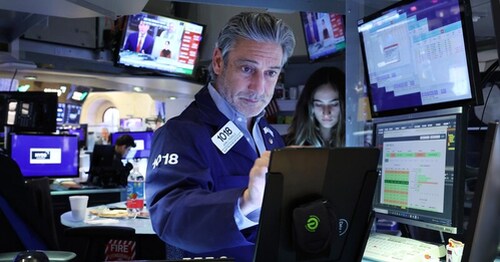
Nasdaq closes at 2-year low Monday, hurt by slumping chip stocks
Stocks closed lower on Monday with the Nasdaq Composite index falling to the lowest level in two years as tech shares continue to be the hardest hit in this bear market because of spiking interest rates.
The Nasdaq Composite closed 1.04% lower at 10,542.10, hitting its lowest close since July 2020, weighed down by a slump in semiconductor stocks such as Nvidia and AMD. The S&P 500 also fell 0.75% to 3,612.39 dragged down by semi stocks and dips in major tech names like Microsoft, while the Dow Jones Industrial Average shed 93.91 points, or 0.32%, to close at 29,202.88.
The declines came as JPMorgan CEO Jamie Dimon warned that the U.S. would likely fall into a recession in 2023, and that it may not be just a mild economic contraction as some economists have projected.
A policy change weighed on semiconductor stocks after the Biden administration announced new export controls that limit U.S. companies selling advanced computing semiconductors and related manufacturing equipment to China. Tech shares have also been hit the hardest in this sell-off as rising rates expose their relatively high valuations and raise their cost of capital.
While the bond market was closed, futures on the 10-year Treasury note were lower in Monday trading indicating yields will continue their march higher on Tuesday. Yields move inversely to prices. The price of 10-year Treasury futures were lower by about 0.6%. Trading volume was also lower than usual on Monday due to the Columbus Day Holiday.
“There are a lot of market participants that really key off of what the Treasury yields are doing, and when they’re not open it’s hard to have that volume in the market,” said Art Hogan, chief market strategist at B. Riley Financial. “We’re probably going to be in wait and see mode until we open in full force tomorrow.”
Investors were also cautious ahead of key earnings and inflation reports this week that will shed new light on the U.S. economy. Four of the world’s largest banks — JPMorgan, Wells Fargo, Morgan Stanley and Citi — report Friday. PepsiCo, Delta and Domino’s are also among companies reporting next week.
September Producer Price Index data comes Wednesday and Consumer Price Index data is scheduled for Thursday.
The Nasdaq’s losses for the year are now greater than 32% after Monday’s decline. The S&P 500 is off by more than 24% in 2022.Stocks closed lower on Monday with the Nasdaq Composite index falling to the lowest level in two years as tech shares continue to be the hardest hit in this bear market because of spiking interest rates.
The Nasdaq Composite closed 1.04% lower at 10,542.10, hitting its lowest close since July 2020, weighed down by a slump in semiconductor stocks such as Nvidia and AMD. The S&P 500 also fell 0.75% to 3,612.39, dragged down by semi stocks and dips in major tech names like Microsoft, while the Dow Jones Industrial Average shed 93.91 points, or 0.32%, to close at 29,202.88.
The declines came as JPMorgan CEO Jamie Dimon warned that the U.S. would likely fall into a recession in 2023, and that it may not be just a mild economic contraction as some economists have projected.
A policy change weighed on semiconductor stocks after the Biden administration announced new export controls that limit U.S. companies selling advanced computing semiconductors and related manufacturing equipment to China. Tech shares have also been hit the hardest in this sell-off as rising rates expose their relatively high valuations and raise their cost of capital.
While the bond market was closed, futures on the 10-year Treasury note were lower in Monday trading indicating yields will continue their march higher on Tuesday. Yields move inversely to prices. The price of 10-year Treasury futures were lower by about 0.6%. Trading volume was also lower than usual on Monday due to the Columbus Day Holiday.
“There are a lot of market participants that really key off of what the Treasury yields are doing, and when they’re not open it’s hard to have that volume in the market,” said Art Hogan, chief market strategist at B. Riley Financial. “We’re probably going to be in wait and see mode until we open in full force tomorrow.”
Investors were also cautious ahead of key earnings and inflation reports this week that will shed new light on the U.S. economy. Four of the world’s largest banks — JPMorgan, Wells Fargo, Morgan Stanley and Citi — report Friday. PepsiCo, Delta and Domino’s are also among companies reporting next week.
September Producer Price Index data comes Wednesday and Consumer Price report is scheduled for Thursday.
Source: https://www.nbcnews.com/business/markets/markets-close-numbers-monday-october-10-rcna51565






